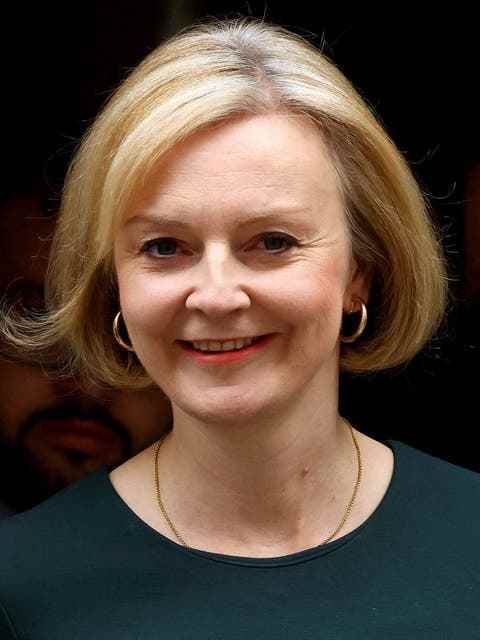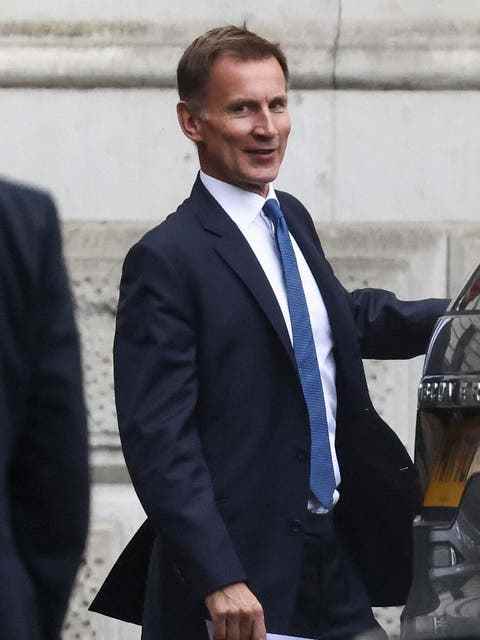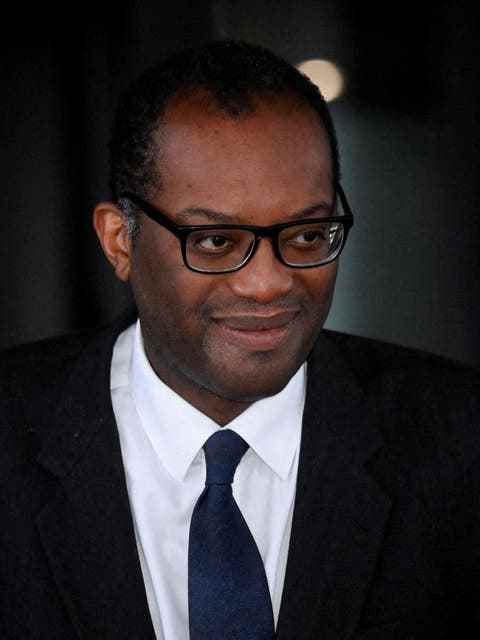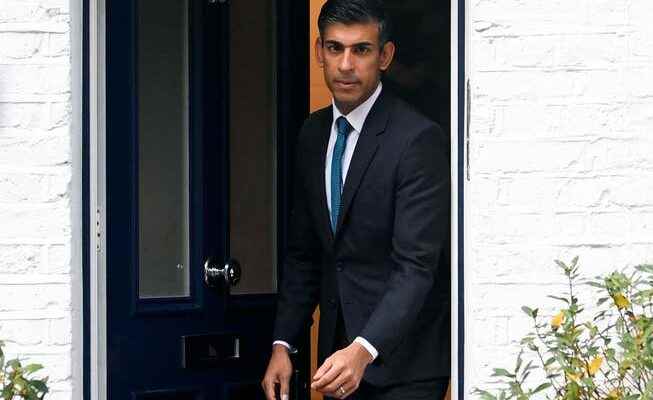Liz Truss took over as Prime Minister in September and is stepping down after six weeks. Labor leader Keir Starmer calls for new elections. The most important questions and answers on the government crisis.
According to media reports, ex-Finance Minister Rishi Sunak has received the necessary backing from his party as the first possible candidate to succeed Prime Minister Truss.
The latest developments:
- Rishi Sunak is running to succeed Liz Truss. This was announced by the former British Chancellor of the Exchequer on Sunday (October 23) on Twitter. The UK is a great country but facing a deep economic crisis. “That’s why I’m running for leader of the Conservative Party and your next prime minister,” Sunak wrote. He wants to fix the economy, unite the party and do something for the country. The 42-year-old, looking back on recent events, pledged that there will be integrity, professionalism and accountability at every level of the government he leads.
- Boris Johnson and Rishi Sunak, the current favorite in the race to succeed outgoing Prime Minister Liz Truss, met for talks on Saturday evening (22 October). At their meeting, however, they could not have agreed on a common solution, both the Telegraph and a Times reporter reported on Sunday, citing insider sources. It was previously speculated the two could agree on a deal in which one of them would take over as prime minister and the other would serve in a senior cabinet position. This could avoid a split in the conservative Tory party. The two had become bitter enemies over the summer, when Sunak resigned as Treasury Secretary in the Johnson administration, contributing to his downfall.
- According to reports, the British ex-Prime Minister and possible renewed candidate Boris Johnson landed in London on Saturday (October 22nd). The 58-year-old was in the Dominican Republic with his wife Carrie Johnson and their children until Friday. According to a party colleague, the British ex-prime minister is in the starting blocks for a renewed candidacy for the office at the top of the government. To the report
- Former UK Treasury Secretary Rishi Sunak has secured the backing he needs from his party as the first possible candidate to succeed Prime Minister Liz Truss. This was announced by his conservative supporters on Friday evening (October 21), according to consistent media reports. Defense Committee leader Tobias Ellwood tweeted that he had the honor of backing Sunak as the 100th Tory MP. The free market experiment – a “low point in the great history of our party” – is now over: “The reset is beginning.” It is time for a “moderate, stable, fiscally responsible government” that can assert itself credibly both internally and externally.
- British Minister for Parliamentary Affairs Penny Mordaunt has been the first to announce her candidacy to succeed outgoing Prime Minister Liz Truss. “I have been encouraged by the support of colleagues who want a fresh start, a united party and leadership in the national interest,” the conservative politician said on Twitter on Friday (October 21). As party leader and prime minister, she wants to unite the country, implement the Tories’ election promises and win the next general election. Applicants need the support of at least 100 MEPs. Nominations can be received until Monday afternoon. When voting in the parliamentary group, two finalists should then be determined, who will face the vote of the party base in an online election.
background
In the internal party competition for the presidency, Liz Truss had promised tax cuts and free-market reforms. She categorically rejected the distribution of “alms” because of the high energy prices. She didn’t keep the promise for long. After three days in office, she announced a massive subsidy and debt package. The cost of the aid package, designed to help households and businesses amid the energy crisis, is £60bn.

British Prime Minister Liz Truss in London.
Tax cuts also play an important role in Truss’ economic plans. At the end of September, Finance Minister Kwasi Kwarteng announced a new tax model from which the wealthiest in particular would have benefited. The new government wanted to boost economic growth. The catch with the plans: they would be financed by government debt.
After the plans were announced, the pound rate plummeted. The British central bank stepped in and bought government bonds with long maturities – without an upper limit. The decision caused resentment within his own party and in the markets. Barely a week later, Truss and the Chancellor of the Exchequer, Kwarteng, at least partially crawled back. The prime minister’s actions have done lasting damage to her fiscal policy credibility.
In polls, more than half of Tory members wanted their resignation. Truss finally felt compelled to do so on October 20th. Her successor had already been discussed in advance. The favorite is former Treasury Secretary Rishi Sunak, who lost to Truss in the race to succeed Johnson in the summer. Also considered promising are Secretary of Parliament Penny Mordaunt and Secretary of Defense Ben Wallace. Today’s Treasury Secretary Hunt is also brought into play, but he himself denied it.
Liz Truss seemed unsettled by the sharp reaction on the financial markets, the pressure from the faction and the poor poll numbers. Truss shied away from making decisions on several issues, or rejected other ministers’ plans altogether.

British Prime Minister Liz Truss fired her finance minister, Kwasi Kwarteng, in mid-October.
As a first consequence, she dismissed her Chancellor of the Exchequer, Kwasi Kwarteng, on October 14. She also announced that she would rescind Boris Johnson’s planned corporate tax hike in order to regain market confidence. However, the hoped-for effect did not materialize. Shortly after taking office, the new Chancellor of the Exchequer, Jeremy Hunt, announced a significant departure from Truss’ original plans.
After Hunt’s about-face, Truss apologized for the turbulence of her short tenure for the first time. In an interview with the BBC, she said the government had gone “too far too quickly”. With a view to her political future, however, the head of government was optimistic: “I will lead the Conservative Party in the next election.” Now that she has announced her resignation on October 20th, there can no longer be any question of that.
Who is Liz Truss?

Treasury Secretary Jeremy Hunt.
Jeremy Hunt succeeds Kwasi Kwarteng as British Chancellor of the Exchequer. Hunt unsuccessfully ran against Boris Johnson to succeed then Prime Minister Theresa May in 2019. After Boris Johnson’s resignation this fall, he offered the party the post again and failed miserably.
Hunt, 55 and in national politics for almost 20 years, is considered calm and professional. Jeremy Hunt can be counted on when the party needs him. He was health and foreign minister in previous governments and had to clean up the chaos of his predecessors.
Shortly after taking office, Hunt threw the economic plans of his predecessor Kwarteng and Prime Minister Liz Truss overboard. This was after neither the dismissal of Truss’ Chancellor of the Exchequer, Kwarteng, nor the waiver of tax cuts for companies had been able to calm the financial markets. Hunt had to double up to defuse the situation. And he did it regardless of his new boss. For example, the government will cancel “almost all” of the tax measures announced in its mini-budget three weeks ago.
Portrait of Jeremy Hunt

Former British Treasury Secretary Kwasi Kwarteng.
As finance minister, Kwasi Kwarteng was responsible for the government’s controversial economic plans. Despite the about-face in the tax cuts for the rich, Kwarteng wanted to stick to other, equally controversial parts of the economic plans. This included tax cuts for other income groups despite enormously high inflation.
According to a report in the Sunday Times, after the announcement of the economic plans, Kwarteng also took part in a party with hedge fund managers who profited financially from the fall in the British pound and encouraged Kwarteng in his course.
On October 14, Kwarteng surprisingly left a meeting of the financial elite at the International Monetary Fund in Washington to deal with the escalating crisis in London. A little later, Kwarteng confirmed rumors about his dismissal on his Twitter channel.
Who is Kwasi Kwarteng?
The future prospects for Great Britain have deteriorated dramatically. According to economic forecasts, the country is threatened with a recession and inflation rates of up to 18 percent. The NHS national health service is on the brink of collapse. And the massively rising energy prices are likely to limit the new government’s financial leeway, since she probably has to help the British: Many Britons are faced with the choice of either heating their homes or buying food. In many households, there will no longer be enough for both.
It is estimated that up to 45 million Britons – two-thirds of the population – will be unable to pay all their bills without going into debt this winter. Truss at least partially mitigated this with a price cap. The average household is said to be paying no more than £2,500 a year for electricity for the next two years.
Because of all the problems, Truss’s successor faces a Herculean task with a view to the 2024 general election of the British Parliament.
In Great Britain, the leader of the party with the most votes is automatically prime minister – provided he can form a government. Normally, this happens through the parliamentary elections, which take place every five years. If, as in the current situation, the head of the ruling party is replaced in an ongoing legislature, no new elections will take place. It is first the parliamentarians of the party and then the party members who choose the new party leader and thus the next prime minister.
The reason for this is simple. In contrast to the USA or France, Great Britain does not have a presidential system. Each party, whether it is a large state party or a small regional one, has one candidate per constituency. The prime minister is also standing for re-election in his constituency. The party leader with the most MPs in parliament then receives the order from the royal family to form a government and thus becomes prime minister.
